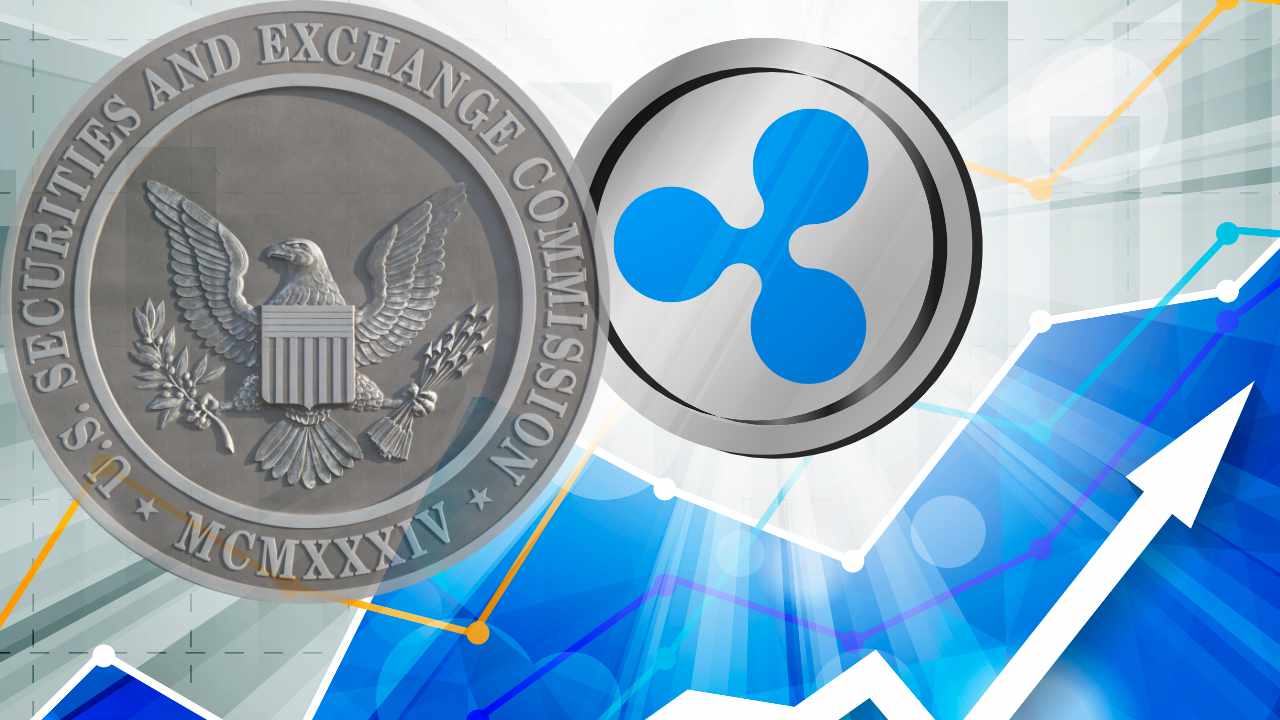
The U.S. Securities and Exchange Commission (SEC) has dropped its aiding and abetting charges against Ripple’s top executives. In a letter to Judge Analisa Torres, the SEC notified the court that it is dropping its charges against Ripple CEO Brad Garlinghouse and co-founder Chris Larsen. The charges were related to the SEC’s original lawsuit from 2020 […]
The post XRP Jumps in Price As U.S. SEC Drops Aiding and Abetting Charges Against Ripple Executives appeared first on The Daily Hodl.

Ripple Labs chair Chris Larsen commented on the recent cases involving Ripple, Grayscale, and the SEC, arguing it is time for Congress to take the lead on crypto policy.
The United States’ legal system is set to bring the crypto industry “back in the game” after the Biden administration “screwed up” its crypto policy, says Ripple Labs chair and co-founder Chris Larsen.
Speaking to Bloomberg on Sep. 7 about his firm’s July partial win against the Securities and Exchange Commission, Larsen argued the regulator lost on “everything that was important to [it] and important in the regulation of the industry.”
“The U.S. screwed up here on crypto and blockchain policy. This is the beginning now through the courts, unfortunately instead of through regulators, to get that clarity and get us back in the game.”
Larsen also commented on the latest court judgment in favor of Grayscale over its application to convert its Bitcoin (BTC) trust into a spot Bitcoin ETF, noting it “really admonished the SEC [...] in a way that you don't really see very often.”
I sincerely hope we’re seeing the beginning of the end of the SEC’s policy of regulation by enforcement. The Courts are rejecting it, and now it’s time for Congress to take the lead on crypto policy.
— Chris Larsen (@chrislarsensf) September 6, 2023
Thanks @EdLudlow @technology for the chat! https://t.co/3gZOR4lq5J
Larsen argued the ruling was proof that SEC chair Gary Gensler knows crypto laws aren’t clear and simply likes the lack of clarity so “he can go after anybody and make up the rules as he goes along through bullying.”
“That's not the American way. We should have clear rules from the legislatures, not through these unelected, power-hungry and really misplaced decision-makers that you see in Gary Gensler.”
Gensler has however previously claimed that the crypto market is full of “fraudsters” and “Ponzi schemes” and that the SEC’s securities laws would help to clean it up.
In another part of the interview, Larsen claimed Biden’s crypto policies “pretty much killed” San Francisco from being the “blockchain capital of the world” despite Silicon Valley’s tech hub reputation.
Related: Grayscale asks SEC to meet on ‘way forward’ for Bitcoin ETF conversion
“We owned it and we don't anymore because the Biden administration, for whatever reason, decided they wanted to push this industry offshore,” Larsen added.
“That was a missed opportunity. It's really unfortunate. Hurt the city.”
He pointed to London, Singapore and Dubai as global blockchain capitals for their “clear rules that protect consumers and also celebrate innovation.”
“Why isn't America leading that call?” Larsen asked. “That's what we've always been, and we've got to get back to it.”
Magazine: Opinion: GOP crypto maxis almost as bad as Dems’ ‘anti-crypto army’

The crypto community has gathered to celebrate the recent ruling on XRP's securities status, but lawyers warn there's more to it than meets the eye.
Ripple Labs’ split-decision victory against the United States securities regulator is being seen as a significant blow to the regulator’s “war on crypto,” however, crypto lawyers warn it isn't a definitive victory for the industry or the firm y
In a landmark ruling on July 13, Judge Torres determined that XRP (XRP) is not a security — at least when sold to the general public.
The decision was met with a joyous uproar from XRP token holders and came with a massive surge in the token's price, with industry heavyweights lauding the decision as likely to aid crypto exchanges Coinbase and Binance in their respective lawsuits.
Luke Martin, the founder of crypto investment firm Venture Coinist noted that the “core component” of the United States Securities and Exchange Commission's (SEC) claim in its suits against Binance and Coinbase is that they offered the sale of unregistered securities on their platforms.
After losing on this matter in the case of XRP, Martin believes this will serve as a substantial blow to the SEC and its chair, Gary Gensler.
He called the decision “inconceivably bullish” for the industry:
This Ripple news is larger than XRP...
— Luke Martin (@VentureCoinist) July 13, 2023
Remember when the SEC went on an all-out attack versus crypto a few months ago?
•Suing Binance for breaking securities rules
•Suing Coinbase for breaking securities rules
•Targeting 10-15 large altcoins as securities
Classifying tokens…
Pro-XRP lawyer John Deaton shared a similar sentiment, stating that Coinbase was the other “winner” from the ruling and that altcoins would stand to benefit.
Similarly, Tyler Winklevoss, the CEO of cryptocurrency exchange Gemini, said the ruling “decimates” the SEC’s case against Coinbase. His twin brother, Cameron Winklevoss referred to the ruling as a “watershed moment” that will make it difficult for the SEC to claim authority over cryptocurrencies.
The Ripple ruling today decimates the @SECGov's case against @coinbase. Have fun with that one @GaryGensler. https://t.co/2lfFXxX2Xf
— Tyler Winklevoss (@tyler) July 13, 2023
Coinbase, Kraken and iTrustShares have already relisted XRP on their respective platforms following the decision.
Despite the positive outcome for XRP, several digital asset lawyers warned against celebrating too soon.
Law firm partner Stephen Palley of Brown Rudnick noted that the summary judgement is only “partial” and that the ruling by Judge Torres isn’t legally binding — instead, it may only serve as persuasive commentary for future courts to follow if they so choose.
A word of caution: that order in the Ripple case is a partial summary judgment from a single district court judge.
— Palley (@stephendpalley) July 13, 2023
While persuasive, it's not binding precedent on other courts and will likely be appealed and could be reversed
don't yolo into anything based on that decision
Palley and others noted that there’s also the chance the SEC may appeal the decision, which presents the possibility that a higher court overturns the rulings made by Judge Torres.
Related: Bad news for Ripple? LBRY judge passes ruling on if secondary crypto sales are securities
Ripple will also need to deal with the SEC’s claim that Ripple CEO Brad Garlinghouse and co-founder Chris Larsen “aided and abetted” the institutional sale of XRP, says U.S. lawyer James “MetaLawMan” Murphy.
Based on my quick read through, it looks like the only thing left for trial would be the claim that Larsen and Garlinghouse "aided and abetted" Ripple's Institutional Sales of XRP--which were the only sales the court found to violate the law. https://t.co/mi7i4Diy9j
— MetaLawMan (@MetaLawMan) July 13, 2023
The SEC alleged $728 million worth of XRP was sold from institutional sales.
United States-based commercial litigator Joe Carlasare ripped Garlinghouse on this point, asserting that Ripple “made $700 million in unlawful profit.”
No, the most important part of the ruling is the Court found that your company broke the law and made illegal institutional sales.
— Joe Carlasare (@JoeCarlasare) July 13, 2023
Your company made $700 million in unlawful profit. Good luck at trial claiming ignorance of Howey https://t.co/qSWEt34yFD
This claim was set aside by Judge Torres, and will likely be contested at trial.
Magazine: Crypto regulation — Does SEC Chair Gary Gensler have the final say?

As the case against Ripple rages on, the SEC wants to see certain “friends of the court” in support of Ripple be barred from providing legal aid to the defense.
The Securities and Exchange Commission (SEC) is attempting to block XRP holders from aiding in Ripple’s defense, and prohibit attorney John E. Deaton from any further participation in proceedings.
In its official objection submitted on July 19, the regulator opposed the decision to recognize 1,746 XRP holders as "amici curiae" along with attorney John E. Deaton.
Amici (plural: amici curiae) means “friend of the court” — an individual or organization not a party to a legal case but is permitted to assist a court by providing information, expertise, or insights. In this case, in support of Ripple’s defense.
Deaton has 3,252 affidavits signed by the token holders essentially stating that they are victims of the SEC’s lawsuit against Ripple as a result of lost profits.
Holders claim in the affidavits that they either did not assume legal responsibility for purchasing XRP, they bought the tokens for utilitarian purposes instead of investment purposes, or they did not buy based on promises made by the company and its representatives.
However, in its objection to XRP holders, the commission claimed that they are attempting to operate outside of strictly legal issues. The SEC wrote:
“Movants do not propose briefing on legal issues. Instead, they wish to present arguments based on 3,252 affidavits “attesting” to certain facts.”
The commission has cited alleged threats by Deaton against former SEC Chairman Jay Clayton as reasoning to dismiss him as amicus. The SEC included a redacted letter dated June 7 to Judge Torres that cites a YouTube video from 2021 in which Deaton stated he “might have to walk over and slap the [profanity] out of former SEC Chair Jay Clayton.”
The XRP holders and Deaton as amici are required to submit a public reply to the SEC’s objection by July 25.
Ripple is a blockchain company that issues the XRP token. The SEC has alleged in an ongoing court case which started in 2020 that Ripple and its executives Brad Garlinghouse and Christian Larsen sold XRP as unregistered securities.
Meanwhile, Deaton has claimed that the SEC has been inconsistent with its application of the law against Ripple, Garlinghouse, and Larsen. In a July 19 thread on Twitter, the lawyer explained that if the SEC truly thought XRP was a security, it would have filed an injunction against Ripple and issued a cease and desist order against the two executives and Jed McCaleb from selling their tokens.
Ripple cofounder Jed McCaleb has sold nine billion XRP since leaving the company in 2014.
The SEC claims #XRP itself is a security and anyone who sells it is violating Section 5 of the Securities Act. The SEC claims @Ripple @bgarlinghouse & @chrislarsensf “enriched” themselves at the expense of investors and it is seeking $1.3B in disgorgement from these defendants. https://t.co/9nJ1iNroth
— John E Deaton (207K Followers Beware Imposters) (@JohnEDeaton1) July 18, 2022
The outcome of this case could determine whether XRP is a security. If the judge rules in favor of the SEC, it could be the precedent the commission needs to pursue legal action against other crypto projects that sold tokens similarly to Ripple.
 According to a World Economic Forum (WEF) tweet, a “change in the way bitcoin is coded could almost eliminate its environmental impact.” That statement stems from a tweet the WEF published on April 26, with an accompanying video that claims “miners could stake their own bitcoins to verify transactions.” WEF on Bitcoin’s Proof-of-Work: A ‘Basic […]
According to a World Economic Forum (WEF) tweet, a “change in the way bitcoin is coded could almost eliminate its environmental impact.” That statement stems from a tweet the WEF published on April 26, with an accompanying video that claims “miners could stake their own bitcoins to verify transactions.” WEF on Bitcoin’s Proof-of-Work: A ‘Basic […] The CEO of Ripple Labs says that the lawsuit brought by the U.S. Securities and Exchange Commission (SEC) against him and his company over XRP “has gone exceedingly well.” He stressed: “This case is important, not just for Ripple, it’s important for the entire crypto industry in the United States.” Ripple’s CEO Comments on SEC […]
The CEO of Ripple Labs says that the lawsuit brought by the U.S. Securities and Exchange Commission (SEC) against him and his company over XRP “has gone exceedingly well.” He stressed: “This case is important, not just for Ripple, it’s important for the entire crypto industry in the United States.” Ripple’s CEO Comments on SEC […]
The U.S. Securities and Exchange Commission (SEC) may have set itself up for failure in its lawsuit against Ripple Labs, according to crypto legal expert Jeremy Hogan. Earlier this week, Judge Sarah Netburn ordered the SEC to present documents related to a 2018 speech made by former SEC Director William Hinman that challenge the notion […]
The post The SEC Set Itself Up for Catastrophe in Lawsuit Against Ripple, Says Crypto Legal Expert – Here’s Why appeared first on The Daily Hodl.

Chris Larsen, co-founder of Ripple also joined in on the call, saying Bitcoin is the “outlier” now that Ethereum’s model is set to change.
Greenpeace, along with other climate groups, and co-founder and executive chairman of Ripple, Chris Larsen, has launched a new campaign aimed at changing Bitcoin (BTC) to a more environmentally friendly consensus model.
The “Change the code, not the climate” campaign aims to pressure key industry leaders, Bitcoin miners, and influencers like Elon Musk, and Jack Dorsey, into moving over to a new consensus model saying:
“If only 30 people — the key miners, exchanges, and core developers who build and contribute to Bitcoin’s code — agreed to reinvent proof-of-work mining or move to a low-energy protocol, Bitcoin would stop polluting the planet.”
Greenpeace cites concerns that the energy required to mine Bitcoin comes mostly from fossil fuels, and that miners are using coal waste and associated natural gas as ways to fuel their operations.
Greenpeace accepted Bitcoin donations for seven years between 2014 and May 2021 before announcing it was halting acceptance of Bitcoin donations, citing environmental concerns. Around the same time, Tesla CEO Elon Musk stopped accepting Bitcoin payments for Tesla vehicles also.
Ethereum (ETH), which currently relies on the same proof-of-work mechanism as Bitcoin, is in the final stages of a lengthy and complicated process to a new proof-of-stake mechanism. Greenpeace says proof-of-stake is much less environmentally harmful due to its lower energy consumption.
“Now with Ethereum changing, Bitcoin really is the outlier,” Larsen said to Bloomberg in an interview published on March 29. “Some of the newer protocols, Solana and Cardano are built on low energy,” he added.
Larsen stated he owns Bitcoin and Ethereum and wanted to see both cryptocurrencies succeed, but that Bitcoin is heading down an unsustainable path. He added that if he had concerns about Bitcoin as competition for Ripple, he would let it continue.
Related: In defense of crypto: Why digital currencies deserve a better reputation
Some of the largest Bitcoin mining companies hold in excess of 5,000 BTC, upward of $237 million at current prices, and data shows that those with the most Bitcoin reserves are increasing their hash rate.
Greenpeace does note this in its manifesto, saying they understand Bitcoin stakeholders have an incentive not to change, as changing Bitcoin would make their expensive equipment much less valuable, meaning sunk costs or “other creative solutions” would have to be implemented.
Chris Bendiksen, a Bitcoin researcher at CoinShares was quoted in the report saying:
“I’d put the chance of Bitcoin ever moving to PoS at exactly 0%. There is no appetite among Bitcoiners to destroy the security of the protocol by making such a move.”
Greenpeace did not immediately respond to a request for comment.

Billionaire Chris Larsen said that miners should view the move away from PoW as “a net positive for their longevity.”
Executive Chairman and Co-founder of Ripple Chris Larsen has unveiled his plan for Bitcoin miners to move away from Proof of Work (PoW), saying they should view it as “a net positive for their longevity.”
He argues it could provide a major boost to the share prices of listed mining firms “as any new code proposal would almost certainly have to include lucrative incentives to gain their support.”
PoW is the consensus algorithm that secures Bitcoin (BTC) transactions on the blockchain. While the Bitcoin network is the most secure and reliable, the amount of energy BTC mining requires causes endless debate in the crypto space. In a Nov. 10 blog post Larsen wrote:
“The emerging solution among climate experts is that Bitcoin’s code needs to be changed to a low energy consensus algorithm like those used by nearly all other major crypto protocols. For example, while Bitcoin uses the energy of approximately 12 million US homes per year, other methods could drive that to fewer than 100 US homes.”
Ethereum is already halfway through the switch to Proof of Stake. While Larsen said this would make Bitcoin an “outlier” he concedes that any similar change would be opposed by most Bitcoin mining companies.
However he’s proposed a solution to fairly distribute the “900 Bitcoin per day” from block rewards and the “approximately 2.1 million additional Bitcoin are to be distributed through the year 2140.”
He suggests that the “least disruptive” solution to BTC’s energy problem is to “take a snapshot of the current hash rate of existing miners and then reward miners on a pro-rata hash power basis.”
“Existing miners would simply have rights to future Bitcoin rewards without the need to expend additional energy or make additional investments in mining rigs.”
The billionaire businessman explained that his plan would give miners “additional economic benefit” and “lucrative gains” because they would gain the same revenue with less operating costs going towards their power bills.
He suggested the “future rewards [...] could be held and tokenized,” concluding that “while the process to enact these plans with consensus across the Bitcoin community will take time, the benefits far outweigh the risks.”
“These assets could be extremely lucrative to existing miners, especially as Bitcoin goes from its current climate disaster status to a truly green financial technology of the future.”
Larsen specifically referenced several U.S. mining stocks including Stronghold Digital Mining (SDIG), Hive Blockchain Technologies (HIVE), Canaan (CAN), Riot Blockchain (RIOT), BIT Mining (BTCM), Bit Digital (BTBT), Bitfarms (BITF), and Marathon Digital Mining (MARA).
Related: Proof-of-stake vs. proof-of-work: Differences explained
Needless to say, the proposals are unlikely to be welcomed by Bitcoiners — or miners who have ambitious plans to increase their share of the hashrate and would miss out on additional revenue through this plan.

Ripple believes records held by offshore exchanges will prove its executives did not violate Section 5 of the Securities Act by offloading XRP on the U.S. public.
Ripple CEO Brad Garlinghouse and co-founder Chris Larsen, have filed a motion requesting the U.S. Securities and Exchange Commission investigate Bitfinex’s parent company, iFinex, and 14 other international crypto exchanges.
The June 2 motion requests documents from exchanges including iFinex, Bitforex, Bithumb, Bitlish, BitMart, AscendEX (formerly Bitmax), Bitrue Singapore, Bitstamp, Coinbene, HitBTC, Huobi Global, Korbit, OKEx, Upbit Singapore, and ZB Network Technology
The motion’s supporting memorandum notes the letters of request solicit assistance from authorities in the Cayman Islands, Hong Kong, South Korea, the United Kingdom, Singapore, Seychelles, and Malta.
The SEC’s amended complaint against Ripple accuses Garlinghouse and Larsen of selling more than two billion units of XRP to “public investors” located “all over the world,” with the SEC seeking disgorgement from Ripple’s executives based on the sales.
Ripple’s executives deny the SEC’s allegations they violated Section 5 of the 1933 Securities Act, emphasizing that Section 5 specifically prohibits the domestic sale of securities without a registration statement. Garlinghouse and Larsen’s legal representation counter that their XRP sales were conducted on foreign exchanges and thus outside of the SEC’s jurisdiction:
“In the case of transactions conducted on such foreign trading platforms, both the offers of XRP and the sales of XRP occurred on the books and records of the respective platforms, and therefore geographically outside the United States. The SEC’s failure to allege domestic offers and sales should be fatal to its claims.”
Ripple asserts the exchanges and related entities subject to its new motion “possess unique documents and information” regarding Ripple’s legal battle with the SEC, specifically concerning “the process by which transactions in XRP allegedly conducted by the Individual Defendants on foreign digital asset trading platforms were conducted.”
The SEC amended its complaint against Ripple and the firm’s executives in February, alleging their sales of XRP suppressed the crypto asset’s price. The complaint also accuses Garlinghouse and Larsen of misleading public investors while offloading billions of dollars worth of XRP as Garlinghouse repeatedly claimed he was “very long” on XRP during the time of the alleged sales.
The filing comes just days after a significant blow was dealt to the SEC’s case against Fipple, with the court rejecting the SEC’s bid to access communications between Ripple and its legal counsel.